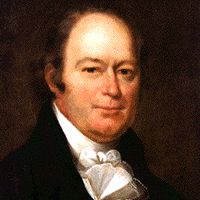Johnson, William Samuel

Johnson, William Samuel (1727-1819) Signer of the Constitution: William Samuel Johnson was born in Stratford, Connecticut, on October 7, 1727. After graduating from Yale in 1744, he studied law, and was admitted to the bar. In 1761 and 1765, he represented Stratford in Connecticut's General Assembly, then in the Governor's Council. He was sent as a delegate to the Stamp Act Congress (1765) in New York, then served in various colonial posts, including judge of the Connecticut Superior Court. After the Battle of Lexington, he delivered a letter to the British, inquiring if a peace settlement might be possible. Since Johnson felt that he could not, in good conscience, take part in a war against Britain; he retired from the governor's council before the Declaration of Independence was signed, and lived in retirement until the end of the Revolutionary War. After the war, he went back to practicing law. From 1784 to 1787, he was a member of the Continental Congress. Then, in 1787, he was placed at the head of the Connecticut delegation to the 1787 Philadelphia Convention, at which the Constitution was written. He became chairman of the committee of five which was given the responsibility of arranging and rewording the articles of the proposed Constitution. Among his suggestions was that the Senate should be organized as a separate body. After he and the other delegates signed the Constitution, Johnson returned to his place in the upper house of the Connecticut Assembly. In 1789, Johnson was elected the first US Senator from Connecticut, and drew up a bill for the establishment of a judiciary system. In March of 1791, Johnson retired to devote more time to being president of Columbia College. In 1800, he had to retire, due to failing health. Known as an excellent orator, he was respected by his colleagues and maintained correspondence with various individuals, including Dr. Samuel Johnson. William Samuel Johnson died in Stratford, Connecticut, on November 14, 1819.
